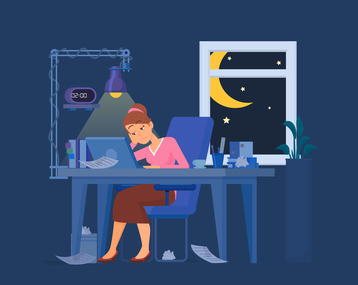Remote work has revolutionized employment for the nation’s workforce. An assistant principal working on-site at a Washington, D.C., school had been earning $125,435. But in 2019, he adopted a remote schedule during the COVID-19 pandemic. He seized the opportunity to take a second job as a principal in a Providence, Rhode Island, school where he worked on-site from 8:30 a.m. to 3:15 p.m. This job lasted for only 17 weeks. His double life finally ended when he resigned from Washington middle school in November 2020.
The U.S. Bureau of Labor Statistics has been the tracking multiple jobholders since 1994. The group holding a full-time plus a part-time position currently comprises 3% of the working population, only down slightly from 3.5% of the population in 1994. Those maintaining two part-time engagements account for only 1.5%, and the busy bees with two full-time jobs represent 0.25%. All the moonlighters’ percentages have remained quite stable over these decades.

Is moonlighting legal?
The short answer is yes unless secondary work is prohibited by an employment contract or it creates a conflict of interest. Employees must not support a competitor or launch a new, rival business. Otherwise, in many states, lawful conduct statutes expressly prohibit action against employees if the external work is undertaken on their own time, with no conflicting loyalties.
Employers find themselves in a quandary. They may resent that their employees appear overly exhausted from working long or late hours. Or their staff may balk at working hours to suit a manager. Firms may indeed suspect their people are spending working hours on activities related to another job, but it is often hard to catch them in the act. Red eyes, stifled yawns and an excessive consumption of caffeine will not make a case.
A realistic policy is to set up reasonable guardrails to discourage extracurricular employment. Management might require these types of restrictions:
- Tell the company openly if you are moonlighting (and define clearly what the term means).
- Maintain standards of productivity on company time.
- Don’t moonlight — or daylight — during basic work hours.
- Strictly observe all fiduciary and confidentiality obligations.
- Don’t use company equipment for outside work, including tools, copiers, software, computers, letterhead or envelopes.
Company policy and handbooks
Nip potential friction in the bud. Clarify that employees are expected to discuss the circumstances with a supervisor before accepting any other job. The conversation with their supervisors can help avoid any potential conflict. For instance, it is a chance to mention that employees cannot represent your company while they are working for another organization. As always, apply the rule consistently and without exceptions. It is important that employees receive permission in writing to prevent misunderstandings and ambiguities.
New hires may be asked to sign a noncompete agreement, or those provisions may be included in an employment contract. A policy manual should cover areas such as performance, safety, confidentiality, professional conduct and prohibited behavior. Does the boss suspect the employee is burning the midnight oil elsewhere? An inkling is not enough. If there has been no breach of an employment contract, an employer may not be able to terminate a worker for suspected moonlighting. Still, either party can normally end an “at will” relationship for numerous reasons, including slipshod performance.
Employees moonlight for a number of reasons, with additional income as a primary factor. Other drivers toward moonlighting include opportunities for advancement, more appreciation and diverting boredom. Employers can respond to those needs by offering increased pay, providing greater recognition or instituting well-timed job rotations. It is usually counterproductive to prohibit moonlighting outright. A ban is difficult to enforce and risks driving away or demotivating talented employees. Rather than outlawing external work altogether, make it clear employees must unequivocally put your work first.
Seek the help of an employment attorney for explanations about conflicts of interest, standards of productivity and performance, or drafting policy materials.
discount enclomiphene purchase discount
cheap enclomiphene cost on prescription